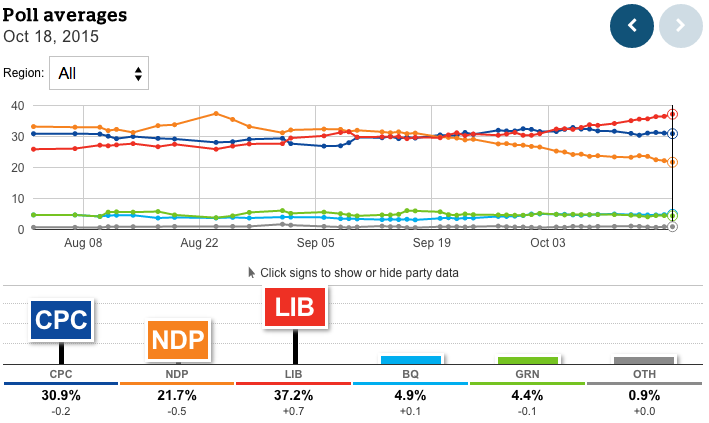
Here in the States, we've been focusing heavily on our own presidential contest, which is still over a year away. But today, citizens in Canada will head to the polls to vote in their nation's parliamentary election and there's a good chance that, by the end of the night, the nation will have a new Prime Minister.
Current Canadian Prime Minister Stephen Harper is running for what would be a rare fourth consecutive term in office, but as of right now, polls show his Conservative Party trailing the Liberal Party and its leader, Justin Trudeau. Polls show the Liberal Party roughly seven points ahead of the Conservatives, but it appears that they will not have enough votes to acquire the 170 seats needed in parliament to make Trudeau the leader on their own. That has led to speculation that the Liberal Party will join in a coalition with the far left "New Democratic Party" in order to build a coalition that will make Trudeau Prime Minister. Trudeau is the son of former Canadian Prime Minister Pierre Trudeau who served three consecutive terms and was then elected to a fourth term after leaving office in the 1970s.

Many Canadians have complained that this particular election cycle has been exceptionally long, lasting 11 weeks. To Americans this may seem laughable given that we are already months into our own presidential campaign.
Yet, an additional wild card that has been added to the mix is how the Toronto Blue Jays' first home game in the American League Championship Series will affect voter turnout.
Despite prognosticators betting that Trudeau will come out on top in the end, a high percentage of undecided Canadian voters may lead to unexpected results.
Major issues in the campaign include:
- Whether or not Harper will continue to push for a ban on the niqab — a veil worn by some Muslim women that partially covers the face,
- Whether Canada will take in Syrian refugees who are currently migrating to Europe and,
- Whether or not to continue to make investments in the Keystone XL pipeline.
